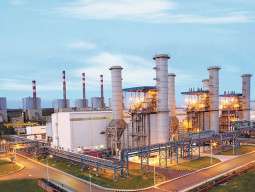
As the turnaround journey continued, and still does, one of the biggest challenges was recovery.
Making them pay
One doesn’t mess with the boys at Al-Karam Square in Liaquatabad, a Karachiite knows this well. Hundreds of apartments are cramped in a cluster of buildings. If a fight breaks out, there is a ready force of 20-plus men to defend their turf.
Like other areas, KESC also tried to make an entrance to disconnect defaulters’ connections. In response, the staff was beaten and told to leave. Another attempt was made and an angry mob burnt a nearby KESC office, not once but twice.

Even involvement of Muttahida Qaumi Movement (MQM) legislators was unable to calm residents. But the utility persisted, meeting resident committees and trying to convince them. It ultimately succeeded.
“The carrot and stick policy works,” said Gauhar. “Power breakdowns were lengthy and recurring when we took over. Now 55% of the coverage area is exempted from any kind of load-shedding, while 5% places see shutdowns of only up to 3 hours a day.”
Industrial consumers, who pay a higher tariff, have completely been excluded from any kind of load-shedding as well. “Our recovery actually started from the elite areas in DHA where the loss was 24%.”
The KESC has distributed its network, running from Gharo in rural Sindh to Vinder in Balochistan, into ‘good and bad areas’. Depending on the bills’ recovery, it was decided which areas should suffer power breakdowns.
The management also went after rotten eggs within the organisation, firing 1,400 workers found to collude with customers in electricity theft.

The transmission and distribution losses have come down to 27.8% from 35.9% in 2008-09.
Out of the box
Meanwhile, there are areas in Karachi like Baldia, Orangi, Gadap, Liaquatabad, Nazimabad and Korangi where KESC recovers only 40% of the billed amount. After all attempts to minimise losses failed, the company looked at the example of India where it is not unusual for private utilities to seek political help for bill recovery.
KESC replicated and outsourced two of the 11 high-loss areas to local politicians, who are responsible for the maintenance of power lines, check theft and recover bills.
In response to its advertisement, KESC received 44 applications from ‘influential people’ who thought they could help. As a test case, Gadap and a part of Organi Town has been handed over.
Gadap Town, where KESC employees would not dare enter places like Al-Asif Square, Gulzar-e-Hijri and Sohrab Goth, is being managed by a local Pakistan People’s Party (PPP) leader Hammad Khan Sherwani under a 80-20 revenue share arrangement. He has done the unthinkable.
“He is close to our breakeven point, which means almost 65% of the billed amount is being recovered,” added Gauhar. “We don’t even want 100% recovery from these low-income areas. A breakeven would do.”
This system has also raised some eyebrows as it could be viewed as a ‘badmash’ collecting bills.
“This is exactly what was discussed with international lenders who are also our equity partners. Sherwani works with our people and we are monitoring him. We will never risk our reputation. So everything he does is within the boundaries of the law.”
It also goes to KESC’s credit that the government now wants to implement these methods elsewhere to curb power theft. Peshawar Electric Supply Company has already issued a tender for the purpose.
Aiming for the exit
Being a private equity firm, Abraaj invested in KESC on behalf of its own international investors. Its model is simple: they see an opportunity to make money in underperforming organisations, invest, take the required return and sell it in 5-6 years.
“We will exit by 2016. Abraaj has invested $361 million in equity. That is not hidden from anyone. So we have to recover that along with a reasonable return,” he said.
After years of suffering losses, KESC has had two profitable ones as it posted earnings of $30 million and $69 million in fiscal 2011-12 and 2012-13 respectively.
“We have fixed the foundations. The KESC won’t go down unless someone comes and does something really stupid,” Gauhar said. “The biggest challenge is to make sure this turnaround is sustainable. The government must help us create an environment to find a suitable investor when the time comes.”
What made him judge others?
Being the youngest CEO in KESC’s history, Gauhar knew there would be difficulties. There was so much criticism that he needed to tell himself and those around him to keep fighting. It was like a war with everyone.
“No one in the country appreciated us. Harvard invited me in April to recognise the work we have done. They used the word turnaround. London Business School and Wharton are carrying our case studies. But we got nothing here.”
Along with his team, he presented the government with a roadmap to fix the energy crisis. No one paid heed to it.
“I have been attacked,” Gauhar said. “I have been labelled anti-labour, capitalist and someone who cuts the electricity supply of poor areas to favour elite neighbourhoods. It was a continuous hammering.”
Instead of being encouraged, politicians alleged KESC was minting money. It has been accused of taking more-than-sanctioned cheaper electricity from the national grid to avoid running its own oil-fired power plants. State-owned utilities have unleashed media campaigns over non-payments and power outages, whereas KESC itself awaits payment of billions of rupees from the government.
Then there were reporters. “They came with requests for new connections, forgoing bills and even jobs for their friends. And when we refused to comply, a barrage of misleading reports would appear against us.”
Gauhar says lack of appreciation has discouraged bright people from taking up jobs in the public sector, creating a void that is now being filled by a politician.
“The irony of Karachi is that it has no ownership. If KESC took ownership of electricity, don’t you think it deserves some applause?”
This was the final piece of a two-part series.
Read part one: KESC turnaround: A success story we all missed — I
Published in The Express Tribune, January 5th, 2014.
Like Business on Facebook, follow @TribuneBiz on Twitter to stay informed and join in the conversation.
COMMENTS (26)
Comments are moderated and generally will be posted if they are on-topic and not abusive.
For more information, please see our Comments FAQ




































1713853507-0/MalalaHilary-(2)1713853507-0-270x192.webp)







Good work but just limited to recovery what about cheap electricity, currently KESC producing high cost energy which is impacting consumers and economy.
Gauhar said. “I have been labelled anti-labour, capitalist ..."- Well I would encourage him to take the ownership of the above mentioned comment as well. Would he deny he doesn't work for capitalist. Simply No and his prime responsibility is to generate the promised return for sponsors. Simply, Yes. The perks he gets paid and on top of that asking for applause from general public for performing the very duties successfully for which he had been hired & paid for. I could smile only in response. Applause comes from public to well deserved social cause and needless to mention the said entity is profit generating institutions.
Maybe Sponsors have failed to applause the young man, which I believe he truly deserves for reaching the goal in country like ours. Yes, universities in Pakistan should teach our business students KESC as a case study.
The transmission and distribution losses have come down to 27.8% from 35.9% in 2008-09.
Can someone explain how a company with 27.8% T&D losses book bottom line profit as KESC posted duirng the last two years?
So the good times will only last till 2016.
2% is still too high but again given the situation of karachi where it impossible to get bills from every wher due to politics who can blame them. govt needs to strengthen police to get the recoveries
Well i think that bright people are going for public organizations but they are reluctant, i believe they will increase in future.
Well, i think bright peoples are going for these organizations but still they are reluctant but i hope that they will increase in future.
Simply outstanding and I hope the progress remains steady.
Karachi has no elected Government. Ownership of the city comes through elected government and decentralization. By the way, even Latin American cities are introducing 3-tiered decentralized systems for cities.
Check out Barcelona website to see what it looks like when people take ownership of a city. Barcelona has 1.6 million people.
Pakistan can be turned around also. Pakistanis are capable of it.
A bright star in a dark country ! Well done sir!
We need selfless, motivated, smart people managing out entities. Bravo way to go KESC.
Appreciating remarkable turnaround in the utility model of Pakistan KESC is a model, which is rightly acknowledged by Harvard, Wharton, LSE and other academic and economic institutions. So much so today KWSB water utility which has failed privatisation as no investor is willing to come on the business model of KWSB will afford to provide water at the cost, which than even is not recoverable. An example of US water utility in Detroit where the utility sought Chapter 11 bankruptcy and sought court protection against creditors, to continue to work and supply. I don't understand if the KWSB is privatised and seek bankruptcy as the model I discussed they will not have to pay any other utility as KESC their dues because the court of law possibly will give them relief to pay when enable. Mr. Tabish Gauhar has not installed solar PV at homes and commercial establishment to overcome load management from the utility. This is a very cheap solution you should seek before the Chinese $6.2 mega Nuclear Power stations starts rolling out and possibly KESC will be the sole distributor of the power to consumers Utility of Pakistan. Smart energy model is ideal, and suggest I may possibly help your company rescue from theft and cut HR cost for meter readings etc.
Mr. Gauhar read the comments on the Part I, people do recognize the good work, this encouragement will lead you to perform more miracles.
Secondly ET did a splendid job letting us know about a marvelous success story totally ignored by the electronic media (particularly by Kamran Khan & Najam Sethi -the Champions) who have many stories to tell but not this one right under their nose.
A Peshawary.
Really commendable!
"The irony of Karachi is that it has no ownership" . The last sentence made me ponder , MQM always says thatt Karachi has no owner ship , now Mr. Gauhar has said that . I being a Karachite know very well what that means , we have always been treated as a step child and will always will be .
FYI I am no MQM supporter.
This really is a shame, Tabish Gauhar does a commendable work and no one pays a heed. I have been a witness to the turnaround of KESC, from 8hrs of load-shedding to virtually zero.
We teach foreign case studies in marketing courses at universities in Pakistan when we have working example in our country.
The dirty politicians should keep themselves away from public utilities and companies, these companies aren't there to be filled with party workers who do nothing other than leeching companies resources.
This is a eye opening case study for every politician, bureaucrat and common user. If every electricity distributor and producer follow what KESC did for Karachi. I think we do not need outside help to fix the energy crisis. Federal govt is blackmailing KESC because they know that if KESC succeed in creating a profitable which they did then, they need to give away LSE, ISE, Pesco etc. which means cannot have their in capable political workers employed at these govt organization and hence they cannot return the favor to them. They all fail to understand that if we get uninterrupted electricity, we all can make decent amount of money, and that too Halal money. I wish Karachi Transport Corporation should also be given to private entity to improve the deteriorating situation in Transport sector. Good luck and best wishes to KESC staff and Management.
Excellent turnaround story. Great work Mr. Gauhar, good luck.
Privatization of all institutions running on tax money be done at priority and in this regard govt should not listen to opposition blocking the process as they are just interested in earning political gains at the cost country.
Govt should seriously evaluate performance of kesc and implement its successful strategies at other power supplying companies.
Gauhar says lack of appreciation has discouraged bright people from taking up jobs in the public sector, creating a void that is now being filled by a politician